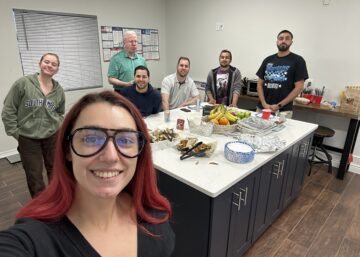
Ana Vasilita is a Senior Client Services Manager in the Funds & Institutions department in our London office. Ana has been with IQ-EQ since November 2019 and joined as a Manager from PwC Cyprus. She currently leads a team which looks after both Private Equity and Debt funds. Ana, who speaks four languages and is of Moldovan origin, took a moment to sit down and talk to us about the importance of diversity and inclusion in IQ-EQ.
What are the benefits to having a diverse workplace?
Oh, there are so many benefits to having a diverse workplace and can range from having a wider pool of ideas to actually making the work environment more interesting and exciting. A diverse workplace drives innovation and efficiencies because people would tend to make more suggestions of improvements based on their experience either in their previous jobs, hobbies or even personal lives. I think being able to innovate in an industry that is constantly evolving is extremely important for a fast-growing organisation like IQ-EQ, as it allows us to stay ahead of the competition and also adapt more easily when entering new markets. Diversity at work can also help us become more humble and considerate towards different social or religious groups and cultures, so effectively having a diverse workplace develops us into being better humans.
How do you build your own understanding of colleagues from different backgrounds?
Since I am a curious person, I always ask questions to understand people better. When I was younger, I would ask any question and that would sometimes get me in trouble, but over the years I learnt that there are things that could be asked and others that should not be asked. I share quite a lot about myself and my life with people around me, so some would feel at ease to open up about theirs, when they do so, and a rapport is established it is easier to discuss even more delicate subjects, understand the reasons why and how they may be affected by various events or actions. I also learnt to not only listen to people, but also see their reaction and assess their feelings in relation to the subject we are discussing. This helps me build a more comprehensive picture of my colleagues and team members and it also allows me to pre-empt trouble when a particular subject comes up in a group discussion that I know some team members are not comfortable with.
How could you contribute in your current role to elevate D&I values?
I think, as a manager, it is important to raise awareness to the team members about our differences and what they mean to the team. Also, where possible I try to accommodate certain needs like for example a longer lunch break to attend prayers or more flexible working hours involving maybe a later or earlier start or even time off for certain activities. From this perspective, I have been blessed with a very understanding and united team who support each other and value each other’s needs, beliefs and differences in general.
What are the three most important skills needed to succeed in your sector?
That’s a tough one. I am not sure what kind of skills are really needed to succeed in this sector, but I think the skills that I find most useful are curiosity and having a good memory. Curiosity helps me to get to the bottom of an issue and therefore come up with a solution easier and having a good memory helps me remember those solutions that worked and apply them in similar situations in the future. I also think curiosity helps you adapt easier in different environments because it encourages learning new things all the time. In terms of the third skill, it would probably be resilience.
Are you involved in other activities in IQ-EQ?
Yes, I am. We have just established the Employee Engagement Team, so you will hear more from me soon.
What advice do you have for anyone leaving formal education?
I went through the whole process of formal education and at that time I believed that it was important to stay and continue my studies, however I have had so many examples throughout my life that people can succeed without it. Actually, I now think that those who leave formal education have an advantage over those who stay, in the sense that they don’t spend three to five years studying for a subject that they may not even like to practice after their graduation. Nowadays, with so many companies offering opportunities to school leavers, it becomes easier to enter industries that previously were not possible without a degree. So, I guess, as a piece of advice, I would say that if you would like to work in a specific industry, believe in yourself and find a company that will be that gateway for you and start from there.



